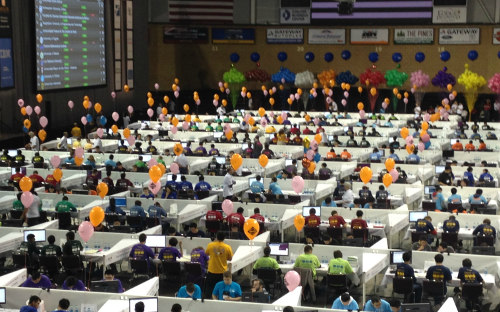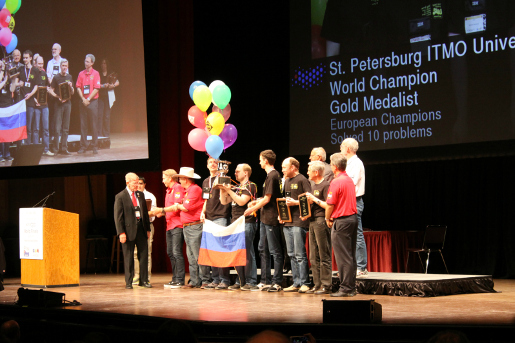Communications of the ACM
St. Petersburg ITMO Team Wins First Place at ICPC World Finals

St. Petersburg ITMO University, a perennial contender in the ACM International Collegiate Programming Contest (ICPC), won the 2017 World Finals competition on Wednesday in Rapid City, South Dakota. The St. Petersburg ITMO team has won the prestigious competition seven times in the last 13 years.
The finals started Wednesday morning, after hundreds of anxious contestants filed into the Rushmore Plaza Arena, sat down at their workstations, and waited for the contest to begin. Two giant projector screens were facing the stands, showing the remaining time, the score of each team, how many solutions to problems have been submitted, and the languages the contestants use. A giant television showed which teams problems were in the queue to be judged.
Spectators filled the stands, many wearing T-shirts supporting teams from faraway places. Some spectators came from across the globe to support their team.
There were 12 programming problems and 12 groups of colored balloons, with each balloon corresponding to a problem. When a team solved a problem, a volunteer would tie a balloon to their workstation. As the contest progressed, the arena was a sea of colorful balloons.

Several teams battled it out for first place for much of the competition, with each team barely able to hang on to the top spot for long. Seoul National University took the lead initially, but Tsinghua University, the University of Warsaw, and St. Petersburg ITMO University eventually surpassed Seoul. With only an hour remaining in the competition, the scoreboard froze. That made it impossible to know how the teams are doing until the end of the competition. Throughout, 891 solutions were submitted to the judges.
Competitors and spectators didn't see where the teams place until the 2017 ICPC World Finals Closing Ceremony.
During the ceremony, it was announced that the 2018 ICPC World Finals would be held in Beijing, China, hosted by Peking University. Song Gao, vice president of Peking University, congratulated the competitors and provided background information on his prestigious university.
Bill Poucher, ICPC executive director, congratulated the coaches for their work with an incredible group of students. "You have some of the brightest students the world here — and they just caused a huge shortage of balloons in Rapid City," he joked. "I don't think you could go downtown and get a balloon now."
Poucher also congratulated the KAIST team for submitting the first correct solution within the final's first five minutes.
"When I look at those massive balloons, I think of the first programming contest I was a co-coach on. So far back in the past, maybe 1976, and we had six hours back then and four team members," Poucher said. "The first correct submission for a problem occurred four hours after the contest started. It is a little embarrassing to tell that story but we were great, we could solve problems faster than anybody else. But you had to deal with key punch machines and key punch operators."
The winner was announced in the last few minutes of the ceremony: St. Petersburg ITMO University. The team rushed to the stage with huge smiles on their faces to accept their medals, plaque, and giant trophy. St. Petersburg ITMO University's team also won in the years 2004, 2008, 2009, 2012, 2013, and 2015.

After the winners were announced, the event ended and students boarded buses to head to a party at the Crazy Horse Memorial. Competitors would get an opportunity to learn about the history of the mountain monument, eat local foods, and watch a large laser light show.
The 2017 ACM ICPC winners and their medals are:
- St. Petersburg ITMO University – Gold
- University of Warsaw – Gold
- Seoul National University – Gold
- St. Petersburg State University – Gold
- Moscow Institute of Physics and Technology – Silver
- Tsinghua University – Silver
- Peking University – Silver
- Fudan University – Silver
- KAIST – Bronze
- Ural Federal University – Bronze
- KTH Royal Institute of Technology – Bronze
- University of Tokyo – Bronze
Kelsey Sinclair, a student at South Dakota School of Mines and Technology, is on assignment for the BLOG@CACM.
No entries found